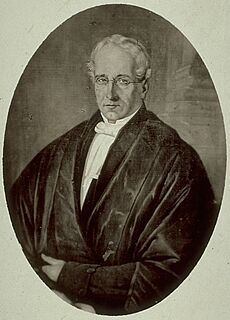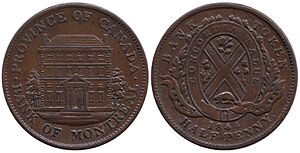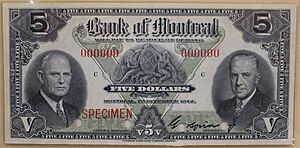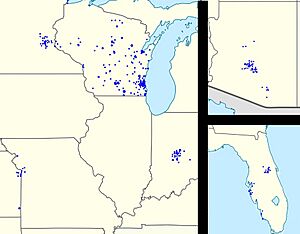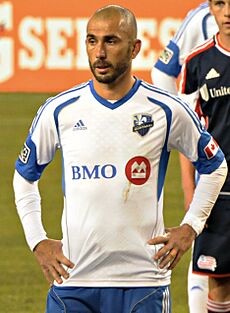Bank of Montreal facts for kids
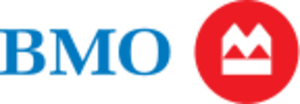 |
|
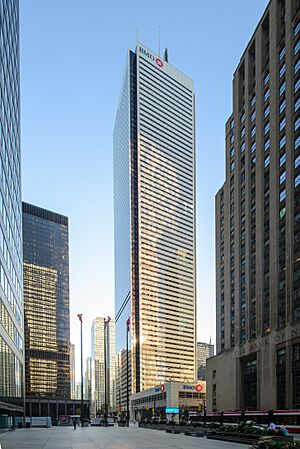
Operating headquarters in Toronto, Canada
|
|
|
Trade name
|
BMO Bank of Montreal BMO Financial Group (US) |
|---|---|
|
Native name
|
Banque de Montréal
|
|
Formerly
|
Montreal Bank (1817–1822) |
| Public | |
| Traded as | TSX: BMO NYSE: BMO S&P/TSX 60 component |
| Industry | Financial services |
| Founded | 23 June 1817 in Montreal, Lower Canada (as Montreal Bank) |
| Headquarters | |
|
Key people
|
|
| Products |
|
| Revenue | |
| AUM | |
| Total assets | |
| Total equity | |
|
Number of employees
|
53,597 (FTE, 2024) |
| Subsidiaries | BMO Capital Markets BMO Bank, N.A. BMO Nesbitt Burns Moneris Diners Club International (North America Operations) Clearpool Group Lloyd George Management LGM Investments AIG Life Insurance Company of Canada Radicle Group Air Miles |
The Bank of Montreal (in French: Banque de Montréal), also known as BMO, is a major Canadian bank that provides financial services to people and businesses around the world. It is Canada's oldest bank, founded in Montreal, Quebec, in 1817.
BMO is one of the largest banks in North America. Its official head office is still in Montreal, but its main operations are run from Toronto, Ontario. The bank is so big that it's traded on both the Toronto Stock Exchange and the New York Stock Exchange.
In Canada, BMO has over 900 branches. It also has a large presence in the United States, especially in the Chicago area, with more than 1,000 branches. In total, BMO serves over 13 million customers worldwide.
Contents
History of BMO
How the Bank Started
The Bank of Montreal was started on June 23, 1817, by a group of nine merchants. They called it the "Montreal Bank." At first, it was a private company, but in 1822, it became a public company owned by 144 people. That's when it officially got its current name, the Bank of Montreal.
The bank grew quickly. In 1818, it opened its first branch in Quebec City and several offices in Upper Canada (now Ontario). It even opened an office in New York City, making it an international bank from its early days.
In the 1830s and 1840s, BMO expanded more into Upper Canada by buying another bank and opening new branches. After Canadian Confederation in 1867, the bank continued to grow. It opened its first branch in Western Canada in Winnipeg in 1877. It also opened branches in the Maritimes, including Halifax and Saint John.
Growth in the 20th Century
The 1900s were a time of major growth for BMO. The bank bought several other smaller banks, which helped it expand across Canada. Some of the banks it acquired were the Ontario Bank (1906), the Bank of British North America (1918), and the Merchants Bank of Canada (1921).
Until 1942, BMO printed its own money, called bank notes. After that, the Bank of Canada became the only one allowed to issue money in the country.
In 1977, BMO moved its main operational headquarters to a skyscraper in Toronto called First Canadian Place. The building was named after the bank's slogan, "The First Canadian Bank." However, the original building in Montreal remains the bank's legal headquarters.
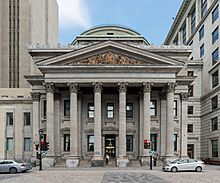
In 1984, BMO expanded into the United States by buying Harris Bank, which was based in Chicago. This part of the company is now known as BMO Bank, N.A.. In 1994, BMO became the first Canadian bank to be listed on the New York Stock Exchange, a major step for the company.
BMO in the Modern Era
In the 21st century, BMO has continued to grow. In 2009, it bought the North American part of Diners Club International, a company known for its credit cards.
In 2010, BMO bought Marshall & Ilsley, a bank based in Milwaukee. This purchase helped BMO become much larger in the United States. Later, the bank had to deal with a legal case related to a business that had used an account at Marshall & Ilsley to trick investors.
In May 2018, BMO and another Canadian bank were targeted by hackers. The hackers claimed they had stolen information from about 50,000 BMO customers.
In 2020, there was an incident at a BMO branch in Vancouver where a 12-year-old First Nations girl and her grandfather were wrongly handcuffed by police over an identification issue. BMO apologized for the event and made changes to its policies. The bank also created an Indigenous Advisory Council to improve its relationship with Indigenous communities.
In December 2021, BMO announced a major purchase: Bank of the West, a large bank in the U.S. This deal, completed in 2023, doubled BMO's size in the United States.
How BMO is Organized
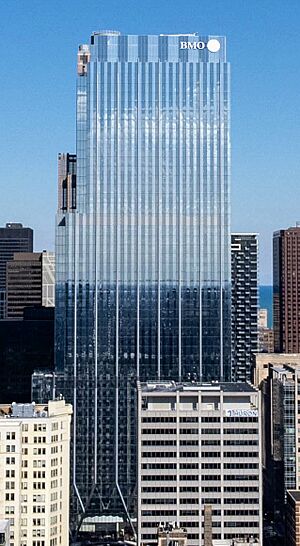
BMO is organized into three main "client groups" that serve different customers.
- Personal and Commercial Client Group: This is the part of the bank most people know. It includes regular banking services for individuals and businesses in Canada (BMO Bank of Montreal) and the United States (BMO Bank, N.A.).
- Investment Banking Group: Known as BMO Capital Markets, this group helps large companies and governments raise money and manage their finances.
- Private Client Group: This group focuses on wealth management, which means helping people with their investments. It includes brands like BMO Nesbitt Burns in Canada.
Sponsorships and Community Involvement
BMO is involved in sponsoring many sports teams and cultural events.
- Soccer: BMO sponsors three Major League Soccer teams: Toronto FC, CF Montréal, and Los Angeles FC. The stadiums for Toronto FC and Los Angeles FC are named after the bank: BMO Field and BMO Stadium. BMO is also a major sponsor of the Northern Super League, Canada's professional women's soccer league.
- Figure Skating: Since 1997, BMO has been a major sponsor of Skate Canada, which organizes figure skating competitions across the country.
- Marathons: BMO is the main sponsor of the Vancouver Marathon, a popular race held every May.
- Arts: The bank is a founder and sponsor of the Siminovitch Prize in Theatre, a major award for Canadian theatre artists.
Famous BMO Buildings
Many of BMO's bank branches are located in historic buildings that are recognized for their beautiful architecture.
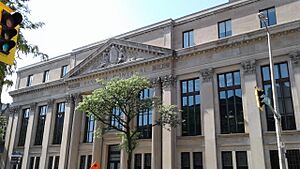
Some branches were designed by the famous architect Andrew Taylor in the late 1800s and early 1900s. The bank's head office in Montreal, built in 1847, is a famous landmark with its tall columns.
Another historic BMO building in Toronto, on Front and Yonge Streets, is now home to the Hockey Hall of Fame.
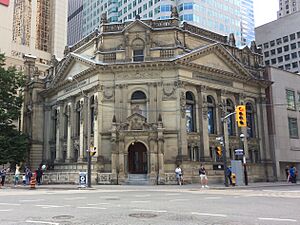
See also
 In Spanish: Banco de Montreal para niños
In Spanish: Banco de Montreal para niños
- BMO SmartFolio
- List of banks and credit unions in Canada
- List of banks in the Americas
- List of largest banks
 | DeHart Hubbard |
 | Wilma Rudolph |
 | Jesse Owens |
 | Jackie Joyner-Kersee |
 | Major Taylor |


